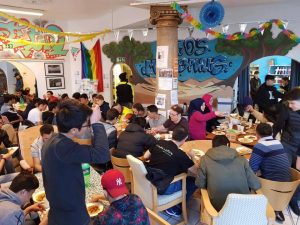Sweden in March: snow, wind and temperatures of 2-3 °C. The perfect time for doing field work. “How do you cope with this weather?” – I asked the president of the Ensomkommandes Förbund organisation, a 23-year old young woman from Afghanistan. „Well, if one has to choose between being safe or being cold, I’m sure that most people will choose this freezing weather”-  she replied with a smile. I couldn’t have agreed more.
she replied with a smile. I couldn’t have agreed more.
We met at the community center of her NGO that was opened for unaccompanied refugee youth in Southern Sweden. The center is managed mostly by unaccompanied young refugees, and it offers a range of courses, from Swedish to photography or modern dances. It is also a popular place to meet with friends after school.
I was in Sweden for the second phase of the EU-funded Marie Curie project on how displaced children (aged 14-18) use digital technology and (social)  media. If during my first trip to the Netherlands, I got to know the work of guardians/mentors and Eritrean music and cuisine, in Sweden I could pinpoint better the impact national and local policies have on asylum-seeking young refugees. Sweden has been in the spotlight recently as it was criticised by international organisations for not enhancing enough the protection of asylum seekers. Moreover, its Finance minister recently declared that she regrets her government’s decision to let more than 160,000 refugees into Sweden, as integration is not working. While the migration debate is quite heated, one has to acknowledge the type of support given to unaccompanied refugee children. From access to digital technologies, private and public housing and a myriad of services/programmes offered by NGOs and volunteers, probably many other EU countries would have a lot to learn from this Nordic country.
media. If during my first trip to the Netherlands, I got to know the work of guardians/mentors and Eritrean music and cuisine, in Sweden I could pinpoint better the impact national and local policies have on asylum-seeking young refugees. Sweden has been in the spotlight recently as it was criticised by international organisations for not enhancing enough the protection of asylum seekers. Moreover, its Finance minister recently declared that she regrets her government’s decision to let more than 160,000 refugees into Sweden, as integration is not working. While the migration debate is quite heated, one has to acknowledge the type of support given to unaccompanied refugee children. From access to digital technologies, private and public housing and a myriad of services/programmes offered by NGOs and volunteers, probably many other EU countries would have a lot to learn from this Nordic country.
As in the case of the Netherlands, I was overcome by the dedication of the mentors and the volunteers who work tirelessly for these children. I also learned a lot from the young people themselves: about ambition, hope and hard work in trying to build up a new life. We talked about apps and social media, and meanwhile we shared stories about food and home and sometimes, struggles.
The next phase of the research will take place in Italy, the country with the biggest share of unaccompanied asylum-seeking children.
I am much indebted to Patrik and his team, Mahboba and Malmö municipality for their support.
Photo credit: the author and Ensomkommandes Förbund.
 Cafe Scientifique: Tuesday 4 June – The lived media experiences of unaccompanied refugee children in Europe
Cafe Scientifique: Tuesday 4 June – The lived media experiences of unaccompanied refugee children in Europe Mentor + Media – a new app for professionals working with refugee youth
Mentor + Media – a new app for professionals working with refugee youth










 Dr. Ashraf cited on ‘Modest Fashion’ in The Guardian
Dr. Ashraf cited on ‘Modest Fashion’ in The Guardian NIHR-funded research launches website
NIHR-funded research launches website Academics write for newspaper in Nepal
Academics write for newspaper in Nepal New paper published on disability in women & girls
New paper published on disability in women & girls MSCA Postdoctoral Fellowships 2025 Call
MSCA Postdoctoral Fellowships 2025 Call ERC Advanced Grant 2025 Webinar
ERC Advanced Grant 2025 Webinar Horizon Europe Work Programme 2025 Published
Horizon Europe Work Programme 2025 Published Horizon Europe 2025 Work Programme pre-Published
Horizon Europe 2025 Work Programme pre-Published Update on UKRO services
Update on UKRO services European research project exploring use of ‘virtual twins’ to better manage metabolic associated fatty liver disease
European research project exploring use of ‘virtual twins’ to better manage metabolic associated fatty liver disease